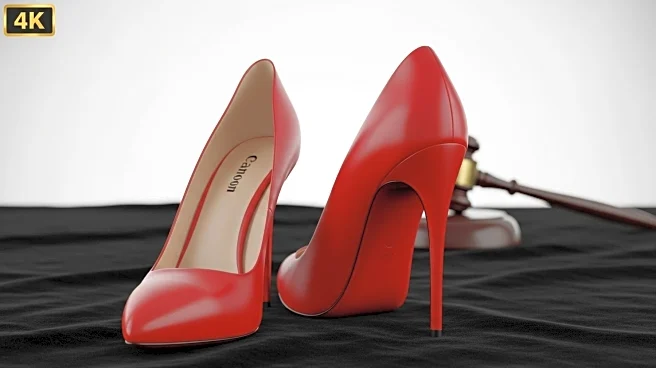What's Happening?
Christian Louboutin has secured a legal victory in Brazil concerning its iconic red sole trademark. The São Paulo court ruled in favor of the French luxury footwear brand, reinforcing the protection of its distinctive red sole design. The case involved Christian Louboutin SAS filing a lawsuit against Bruna Silvério Shoes and Facebook Serviços Online do Brasil, accusing them of producing and promoting unauthorized replicas of Louboutin's red-soled shoes. The court's decision mandates Bruna Silvério Shoes to cease manufacturing and selling the infringing products and requires Facebook to remove related content from its platforms. This ruling aligns Brazil with other jurisdictions that recognize the red sole as a protectable trademark, despite the lack of formal registration in Brazil.
Why It's Important?
The ruling is significant as it strengthens the legal framework for protecting non-traditional trademarks in Brazil, particularly those with global recognition. For brands, this decision offers reassurance that distinctive visual identities can be safeguarded under Brazil's unfair competition laws, even without formal trademark registration. It also highlights the importance of trade dress protection, which allows brands to protect the overall visual presentation of their products. For consumers, the ruling preserves the integrity of one of fashion's most iconic symbols, ensuring that the red sole remains a mark of luxury and craftsmanship. This case sets a precedent for future trademark disputes in Brazil, potentially influencing how courts handle similar cases involving globally recognized brand identifiers.
What's Next?
Following the court's decision, Bruna Silvério Shoes must comply with the order to stop producing and selling the infringing products, while Facebook must ensure the removal of related content. The ruling may prompt other brands to seek similar protections for their distinctive designs in Brazil, potentially leading to more legal actions in the fashion industry. Additionally, the decision could influence legislative discussions on trademark laws in Brazil, encouraging the adoption of more robust protections for non-traditional trademarks. Brands operating in Brazil may need to reassess their strategies for protecting their intellectual property, considering the implications of this ruling.
Beyond the Headlines
The case underscores the evolving nature of trademark law, particularly in the context of global branding and the fashion industry. It highlights the challenges brands face in protecting their unique designs across different jurisdictions, especially when formal trademark registration is not available. The decision also raises questions about the balance between protecting brand identities and allowing competition in the market. As brands continue to expand globally, the need for consistent and effective trademark protection becomes increasingly important, influencing how companies approach their intellectual property strategies.










